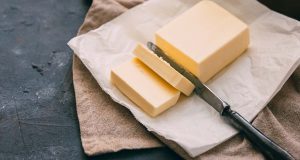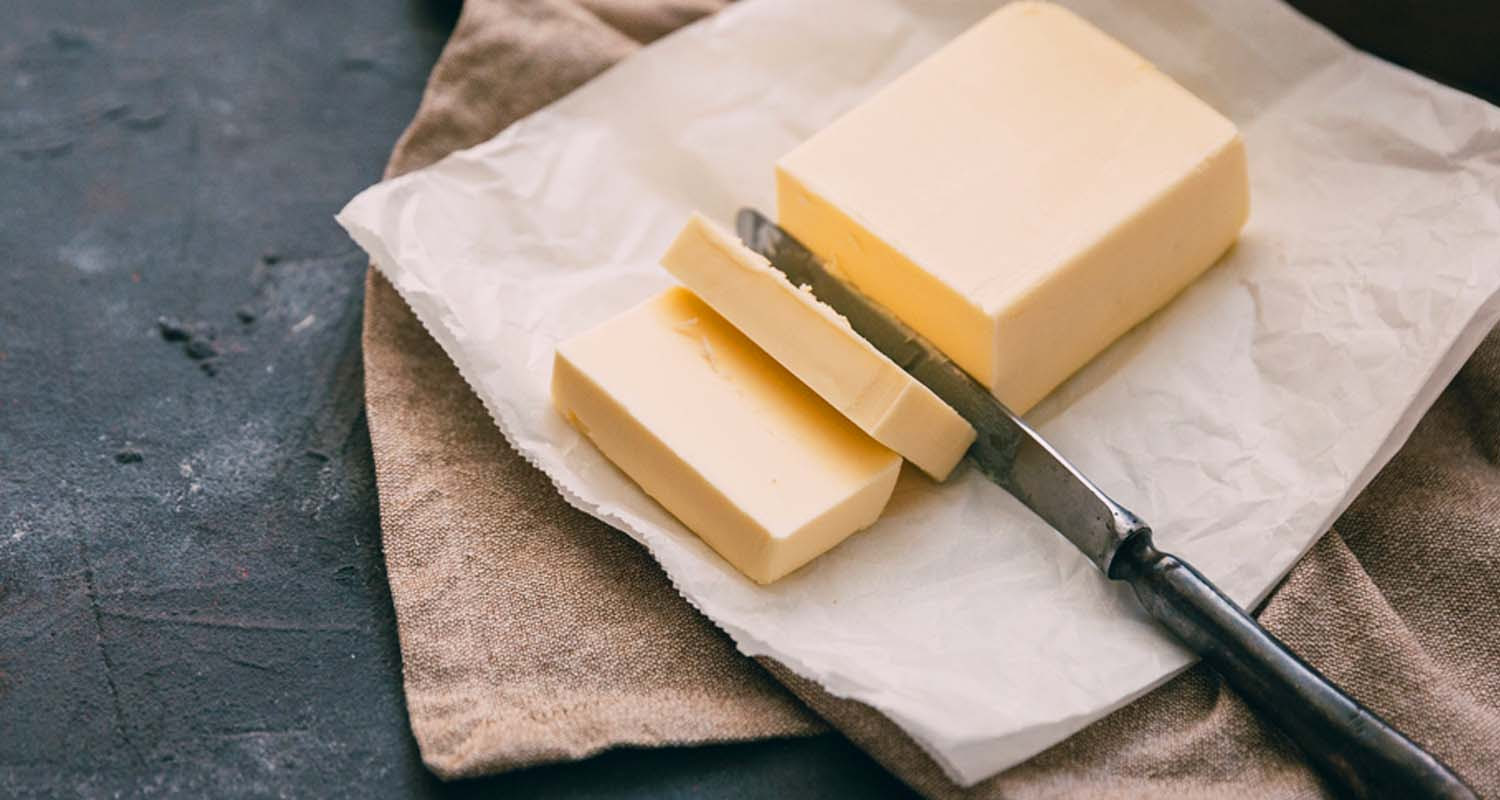2021 Wellness Program “The Beauty Chef”!
Butter
Grass-Fed Butter 101: What It Means
 Where does butter come from?
Where does butter come from?
Butter is made by churning fresh cream from cow’s milk. The butter (or fat) naturally separates from the buttermilk during churning.
To make grass-fed butter, also known as pastured butter, you need milk from grass-fed cows.
Grass-fed cows are allowed to graze on green, grassy pastures, which is the best food source for them and the one they’re physiologically designed to eat.
Since they feed on grass, they produce grass-fed milk, which creates grass-fed cream, which then can be made into grass-fed butter (GFB).
Cows who don’t get to live the grass-fed life are stuck chowing down on commercial feed which is usually chock full of:
- Corn and soy (which are most likely GMOs)
- Grains
- Miscellaneous high-starch foods
- Hormones
- Antibiotics
- Other supplemental byproducts of vegetable oils
See the difference between these two diets?
What cows eat — just like what humans eat — matters a great deal.
Grass contains a lot of phytonutrients, one of which is beta-carotene, a precursor of vitamin A. This is the same antioxidant you’ll also find in carrots and tomatoes.
You can tell the difference between grain-fed and grass-fed butter just by looking at their appearance: commercial butter is pale yellow or white while grass-fed butter has a rich, deep yellow hue.
That may be one reason why grass-fed butter scores higher marks in flavor and appearance than grain-fed in consumer studies.
But cows feasting on fresh green grass also improves the nutritional properties found in regular ol’ butter.
Now that you know the difference between grass-fed and grain-fed, what about other types of butter? Here’s what other labels mean:
- Organic butter: “Organic” is not the same as “grass-fed.” While organic butter is free of pesticides, it’s not necessarily grass-fed. So if you want true grass-fed butter packed with nutrients, an organic butter won’t cut it.
- Irish butter: Irish butter is a European-style butter that comes directly from Ireland. It’s made from grass-fed cow’s milk and has a higher fat content than regular butter, which gives it a richer texture. Most of the time, Irish butter is grass-fed butter.
5 Reasons Why Grass-Fed Butter Is Better Than Grain Fed
Here’s what you’re getting nutrition-wise in grass-fed butter, and why it’s a better choice than grain-fed:
#1: Lots of Delicious, Healthy Saturated Fat
Grass-fed butter may be one of the healthiest dairy products on a ketogenic diet menu.
Butter is basically pure fat; it has zero carbs, zero sugars, and zero grams of protein.
One tablespoon of grass-fed butter contains:
- 100 calories
- 11g of fat
- 7g of saturated fat
- 0g trans fat
As you can see, most of butter’s fat is saturated.
If you’re on a ketogenic diet, you probably already know that saturated fat is healthy.
Even though saturated fat used to be blamed for contributing to heart disease, scientists have now debunked that myth.
Believing that saturated fat is bad is outdated and it was a myth to begin with.
Turns out, sugar and trans fat are the ones causing high cholesterol, high blood pressure, and heart disease all along, not healthy fats.
Fat from healthy sources like grass-fed butter and coconut oil can actually help you lose weight, with an abundance of fatty acids like conjugated linoleic acid in butter, and medium-chain triglycerides in coconut oil.
In fact, the milk fat used to make butter is the most complex of all natural fats, since it’s over 80% pure fat and contains 400 different fatty acids.
One of those fatty acids is pretty famous as we’ll discuss next.
#2: More Essential Omega-3 Fatty Acids
Grass-fed butter has higher concentrations of omega-3 fatty acids than grain-fed butter.
Omega-3 fatty acids — a type of polyunsaturated fat — are essential for your body, but you can’t produce them on your own, so you must get them from your diet.
This is why omega-3s are vital:
- They’re a major component of your body’s cell membranes
- They control signaling between cell receptors
- Help create hormones to regulate blood clotting
- Aid in contracting and relaxing your artery walls
- Lower inflammation
Grass-fed butter also contains more CLA — a type of healthy omega-6 fatty acid — than butter made from grain-fed cows.
#3: 500% More Conjugated Linoleic Acid (CLA)
Cows allowed to graze in pastures can have 500% more CLA in their milk than their grain-fed sisters.
So what is conjugated linoleic acid anyway?
CLA is a long-chain omega-6 fatty acid you’ll find in meat and dairy products, which can:
- Prevent cardiovascular disease
- Lower your risk of cancer
- Improve bone mass
- Fight inflammation
- Boost your immunity
Certain companies are even using CLA as a diet pill to help you lose weight.
To keep this fatty acid train rolling, grass-fed butter also contains butyrate.
#4: Butyrate — The BFF You Didn’t Know You Needed
Butyrate is a short-chain fatty acid (SFCA) that your gut bacteria can consume to grow and potentially improve your gut health. It can also:
- Reduce your risk of heart disease
- Boost your energy
- Help maintain healthy digestion
- Butyrate is readily available in grass-fed butter. This SCFA doesn’t need any digestive enzymes or bile production to work, so it’s super easy to absorb and fast to use.
What else is hiding in grass-fed butter? You may not be expecting it, but it’s vitamins.
#5: Fat-Soluble Vitamins and Antioxidants
You don’t normally associate vitamins and antioxidants with butter, but grass-fed butter is packed with them.
Studies show that butter made from pastured cows’ milk is significantly higher in fat-soluble vitamins such as:
- Vitamin A
- Vitamin D
- Vitamin K
- Vitamin E
As you can see, grass-fed butter trumps grain-fed butter any day of the week. It’s also an excellent option if your budget does not allow you to get grass-fed beef on a regular basis. Adding grass-fed butter to “regular” meat is a great and more affordable compromise.
9 Health Benefits of Grass-Fed Butter
Here’s what all those different types of fats and vitamins found in grass-fed butter can do for your body:
#1. Lower Inflammation
We hear a lot about why we should lower inflammation, but what does that really mean?
Inflammation is your body’s response to injury. But chronic, internal inflammation is caused by things like poor diet and lifestyle.
Without acute inflammation, which sends white blood cells to combat foreign enemies, you’d get fatal infections from simple cuts.
But chronic inflammation occurs when your body remains on high alert all the time, in response to stress, poor dietary choices, and other lifestyle habits.
Inflammation is also thought to be the cause of most diseases and chronic medical conditions, including:
- Asthma
- Arthritis
- Alzheimer’s disease
- Cancer
- Heart disease
- Irritable bowel syndrome (IBS)
- Parkinson’s disease
- Type 2 diabetes
- Ulcerative colitis (UC)
- Crohn’s disease
While certain fats and oils — like trans fats and canola oil — increase inflammation, grass-fed butter does the opposite.
Inside every tablespoon of grass-fed butter, you’ll find butyrate, a long-chain fatty acid that can help lower inflammation.
Butyrate lowers inflammation via many pathways, but the main pathway involves a transcription factor called NF-κB.
Think of NF-κB as a switch that turns on or off hundreds of other inflammatory switches.
For more health benefits of butyrate, check out this article: Should You Supplement With Butyrate?
#2. Heal a Leaky Gut
Your gut is the most common spot where system-wide inflammation begins.
When you have an inflammatory bowel disease or leaky gut syndrome, undigested food particles have the ability to leach out of your digestive tract and into your bloodstream.
Since these particles shouldn’t be there, you experience inflammation as a response to the foreign invaders.
A deficiency in butyrate may contribute to these digestive conditions.
See, butyrate patches up the holes in your digestive tract, so increasing butyrate has been shown to stop inflammation and provide relief for leaky gut symptoms.
And thanks to its anti-inflammatory effects, continued butyrate intake may lead to improvement and even remission for those suffering from Crohn’s disease.
It’s also shown to reduce the symptoms of ulcerative colitis.
Speaking of inflammation, medical professionals also think chronic inflammation is to blame for heart disease.
#3. Improve Your Heart Health
Heart disease is the leading cause of death around the world.
As we touched on earlier, health professionals used to think that saturated fats from butter and animals contributed to high cholesterol and eventually heart disease.
But as more people stopped eating butter, bacon, and eggs, heart disease and obesity rates went through the roof. What gives?
It turns out that grains and sugar are the real culprits of this American epidemic — and healthy fats can help reverse it.
Evidence shows people who add more grass-fed dairy to their diets have lower risks of heart disease.
Check this out:
Cows in Australia are grass-fed. A 16-year study there showed citizens eating the most high-fat dairy products had a 69% lower chance of dying from heart disease than those who didn’t eat them.
New Zealand also has its own famous brand of grass-fed butter called Anchor butter. Even though it’s not certified USDA organic, it’s made with free range, grass-fed cows.
Costa Rica also believes in grass-feeding their cows.
A study conducted there compared the fatty tissue of close to 2,000 patients who had heart attacks and lived with another group of 2,000 people who did not have heart attacks but had similar health markers.
Researchers noticed higher CLA levels (a good indicator of a diet full of high-fat dairy products) in participants without heart attacks.
So, increased CLA consumption may lead to lower risks of heart attacks. Good thing grass-fed butter has 500% more CLA than grain-fed butter, right?
Grass-fed butter is also one of the best sources of vitamin K2.
Vitamin K2 has been studied for its ability to ward off atherosclerosis (aka plaque build-up) and heart attacks.
In the now-famous Rotterdam Study, participants with the highest intake of vitamin K2 in their diets had 57% lower risk of dying from heart disease and a 26% lower chance of dying from all other causes.
Researchers from another trial learned that every 10 micrograms of vitamin K2 women have per day lowers their risk of heart disease by 9%.
Vitamin K also plays a major role in protecting your calcium stores.
#4. Keep Calcium in Its Lane
Did you know there are actually two important forms of vitamin K?
- Vitamin K1 is found in plants like leafy greens and is essential for blood clotting
- Vitamin K2 is found in animal products and may be able to reduce both osteoporosis and heart disease
Wondering how heart disease and osteoporosis are related?
Calcium is supposed to stay in your bones, but it can leach into your bloodstream and build up inside your arteries.
However, meeting your vitamin K2 requirement may prevent this.
See, vitamin K2 slightly changes proteins so they can bind to calcium ions more strongly.
This means vitamin K2 may keep calcium in your bones and out of your bloodstream to prevent both heart disease and osteoporosis.
Plus, vitamin K2 is super important for calcium metabolism. When you don’t have enough K2 in your system, calcium has a tendency to drop off in random deposits throughout your body.
These calcium deposits can become painful kidney stones and gallstones. They also increase your chances of osteoporosis and osteoarthritis.
Vitamin K2 becomes a magnet to attract all these calcium deposits and put them back where they belong (in your bones).
Grass-fed butter is one of the best sources of K2. That’s because the grass is naturally high in vitamin K1 and when cows eat it, their digestive systems convert it to K2.
Grain-fed cows don’t have access to this type of nutrient.
#5. Reduce Your Cancer Risk
While certain vegetable oils may contribute to the development of cancer, others such as olive oil and avocado oil may protect your cells from mutating.
Butter is in the category with the good guys.
One study showed milk from grass-fed cows had positive effects on the metabolism of rats when it came to cholesterol levels, inflammation and cell damage — all precursors to cancer cell growth.
That may be thanks to butyrate (again), which has been studied for its positive role in colon cancer prevention.
In a nutshell, butyrate:
- Prevents and halts inflammation in your colon
- Stops precancerous and cancerous cells from multiplying
- Reinforces your colonic defense barrier
- Decreases cell damage so cells are less vulnerable to becoming cancerous
CLA also has a few cancer-fighting properties up its sleeve.
Studies show adding just 0.5% of CLA to your diet can reduce the growth of tumors by over 50%.
And remember good ol’ vitamin K2?
It’s been known to induce cell death in cancerous cells.
While these are all perks of eating grass-fed butter in the long-term, let’s talk about what it can do in the short term too.
#6. Increase Your Mental Focus and Physical Energy
Butter has both short- and medium-chain triglycerides (MCTs).
Both your muscles and your brain can use MCTs quickly for energy. This is why so many keto dieters love adding grass-fed butter, MCT oil powder, or pure MCT oil to their keto bulletproof coffee every morning.
MCTs can even suppress your appetite, as you’ll see next.
#7. Lose Weight Without Starving
When you switch from burning carbs to burning fat, you’ll be part of the many who realize fat keeps them feeling fuller and more satiated than a low-fat diet full of carbs.
Maybe that’s why low-fat diets have been associated with:
- Greater overall hunger
- More weight gain
- Slower metabolisms
On the flip side, high-fat diets have been associated with lower obesity rates.
There’s even a hypothesis that a lack of CLA from high-fat dairy sources like grass-fed butter may be one of the reasons why everyone’s getting chunkier.
All the CLA found in grass-fed butter not only ramps up your metabolism, it also lends your body a hand in breaking down your excess fat reserves.
In one study of overweight and obese volunteers, participants were split into groups taking a placebo or a CLA supplement for 12 weeks. Researchers noticed the group taking the CLA reduced their body fat mass significantly.
CLA may even play a part in blood sugar control.
#8. Control Your Insulin and Blood Sugar Levels
CLA may improve insulin sensitivity, which means your body becomes more capable of stabilizing your blood sugar levels.
During one study, participants noticed a “significant effect” on weight loss, insulin, and blood glucose levels when they added CLA to their diets for at least eight weeks.
Research shows CLA may be so effective at improving your insulin sensitivity it has the same results as synthetic diabetes drugs without any of the bad side effects.
That’s news to put a spring in your step, which is exactly what our last health benefit of grass-fed butter does too.
#9. Look and Feel Better
Grass-fed butter has more vitamin A per tablespoon than regular butter from grain-fed cows.
True vitamin A, also known as retinol, is only found in large quantities in animal products like grass-fed dairy, organ meat, and free range egg yolks.
Here’s what your body uses vitamin A for
- Forming and maintaining your skin, skeleton, soft tissue, and teeth
- Keeping your night and low-light vision healthy
- Maintaining your endocrine and neurological system
- Preserving your immune function
- Reproduction and breastfeeding
Vitamin A is also helpful for your beauty regimen. Retinol is an anti-aging wonder vitamin that may be able to
- Improve skin texture
- Prevent acne
- Add shine to your hair
- Control eczema
Combine retinol found in grass-fed butter with collagen protein powder, which improves your hair, skin, and nails, and you may see a real difference in the texture and elasticity of your skin.
HOMEWORK
Change your butter!
Island Kitchen Weekly Lunch Special!

This week: Cashew Butter Chicken
pg. 173 “The Beauty Chef”
Stop by or call to order this delicious healthy meal option!
11 N 3rd St, Fernandina Beach
(904) 624-7447


